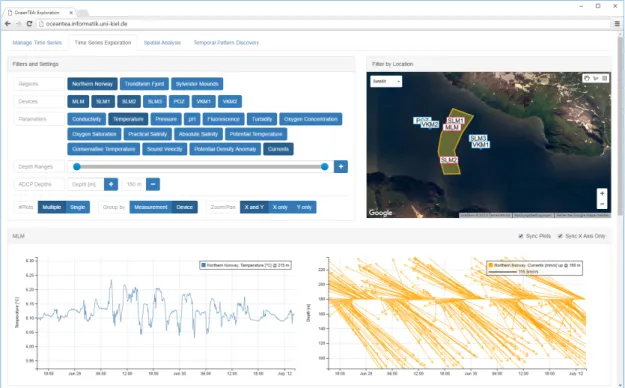OceanTEA: A Platform for Sharing Oceanographic Data and Analyses
Arne Johanson,
aReiner Jung,
aSascha Flögel,
bWolf-Christian Dullo,
bWilhelm Hasselbring
aaSoftware Engineering Group, Kiel University, Germany
bGEOMAR Helmholtz Centre for Ocean Research, Kiel, Germany
Ocean observation systems, such as the global array of more than 3000 free-drifting Argo floats belonging to the Global Ocean Observing System [1] or the modular ocean laboratory MoLab [2, 3], produce an increasing amount of time series data. Both, sta- tistical data mining techniques and manual exploration via visualization are necessary for oceanographers to extract scientific knowledge from such vast datasets. Therefore, scientists require a platform to explore and analyze data visually, supporting their col- laboration and research. To deliver results and foster the impact of publications, such platform should facilitate automatic and interactive access to research results for scien- tists, their peers and the public.
Our software platform OceanTEA (OceanographicTime SeriesExploration andAnal- ysis) supports oceanographers in their research and publication efforts (Figure 1). The platform leverages modern web technology to support scientists in interactively explor- ing and analyzing high-dimensional datasets. By relying on a microservice architecture [4, 5], OceanTEA can be deployed on desktop computers as well as cloud comput- ing infrastructure with built-in scalability. Therefore, OceanTEA can be used to make data and analyses available on the web. This helps scientists to collaborate on exploring datasets (e.g., with limited access within an institute) as well as for providing interactive visualizations along with journal or conference publications. For example, OceanTEA is currently employed in studying the impact of ongoing climate change on cold-water coral reef ecosystems [6], demonstrating its applicability to the domain.
We ensure the sustainability of OceanTEA by releasing its source code (Apache 2.0 license [7]) and providing an online live demo which are both available on GitHub.1 In the future, we will apply OceanTEA to scientific projects within the cluster of excellence Future Oceanfunded by the German Research Foundation. By supporting research in the cluster, we secure resources for the maintenance and evolution of OceanTEA. Our
1https://github.com/a-johanson/oceantea
1
Figure 1: The data exploration view of OceanTEA.
tool facilitates open science by providing access to data, by supporting scientists in their publication efforts, and by providing source code and documentation of our platform.
OceanTEA already implements the management of time series data, their interactive exploration, and a spatial analysis component (a screenshot of the exploration view of OceanTEA is displayed in Figure 1). A module which offers temporal pattern discovery in multiple time series is currently being developed. Furthermore, we plan to extend OceanTEA to become a platform to support the creation of executable papers [8] for sci- entific publications based on ocean system simulations. As a first step, we implemented an interactive illustration of modeling results with OceanTEA to accompany our pub- lication on cold-water coral reef systems mentioned above [9]. In this way, OceanTEA can be used to create dynamic visualizations of figures in papers to add value to pub- lications reporting on data-driven research right from the beginning of the peer review process. Thereby, we incentivize authors to make their data publicly available.
2
Acknowledgments
This project was funded by the Cluster of Excellence 80 “The Future Ocean.” The
“Future Ocean” is funded within the framework of the Excellence Initiative by the Deutsche Forschungsgemeinschaft (DFG) on behalf of the German federal and state governments.
References
[1] Dean Roemmich, Gregory C. Johnson, Stephen C. Riser, Russ E. Davis, John Gilson, W. Brechner Owens, et al. “The Argo Program: Observing the Global Ocean with Profiling Floats”. In:Oceanography22 (2009), pp. 34–43.
[2] Lorenzo Rovelli, Karl M. Attard, Lee D. Bryant, Sascha Flögel, Henrik J. Stahl, Murray Roberts, et al. “Benthic O2 uptake of two cold-water coral communities estimated with the non-invasive eddy-correlation technique”. In: Marine Ecology Progress Series525 (2015), pp. 97–104.
[3] Sascha Flögel and Wolf-Christian Dullo. “High-resolution water mass measure- ments around cold-water corals: a comparative test study between repeated Con- ductivity-Temperature-Depth (CTD) casts and continuous data acquisition of bot- tom waters from the West Florida Slope, Gulf of Mexico”. In:Annalen des Naturhis- torischen Museums in Wien. Serie A für Mineralogie und Petrographie, Geologie und Paläontologie, Anthropologie und Prähistorie(2011), pp. 209–224.
[4] Sam Newman.Building Microservices. O’Reilly, 2015.
[5] Eberhard Wolff.Microservices: Flexible Software Architectures. CreateSpace, 2016.
[6] Sascha Flögel, Wolf-Christian Dullo, Olaf Pfannkuche, K. Kiriakoulakis, and An- dres Rüggeberg. “Geochemical and physical constraints for the occurrence of liv- ing cold-water corals”. In:Deep Sea Research Part II: Topical Studies in Oceanography 99 (2014), pp. 19–26.
[7] The Apache Software Foundation.Apache License, Version 2.0.https://www.apache.
org/licenses/LICENSE-2.0. 2004.
[8] Pieter Van Gorp and Steffen Mazanek. “SHARE: a web portal for creating and sharing executable research papers”. In: Procedia Computer Science 4 (2011). Pro- ceedings of the International Conference on Computational Science (ICCS 2011), pp. 589–597.
[9] Arne N. Johanson, Sascha Flögel, Wolf-Christian Dullo, Peter Linke, and Wilhelm Hasselbring.Modeling Polyp Activity of Paragorgia arborea Using Supervised Learning.
https://github.com/a-johanson/paragorgia-arborea-activity. 2016.
3
